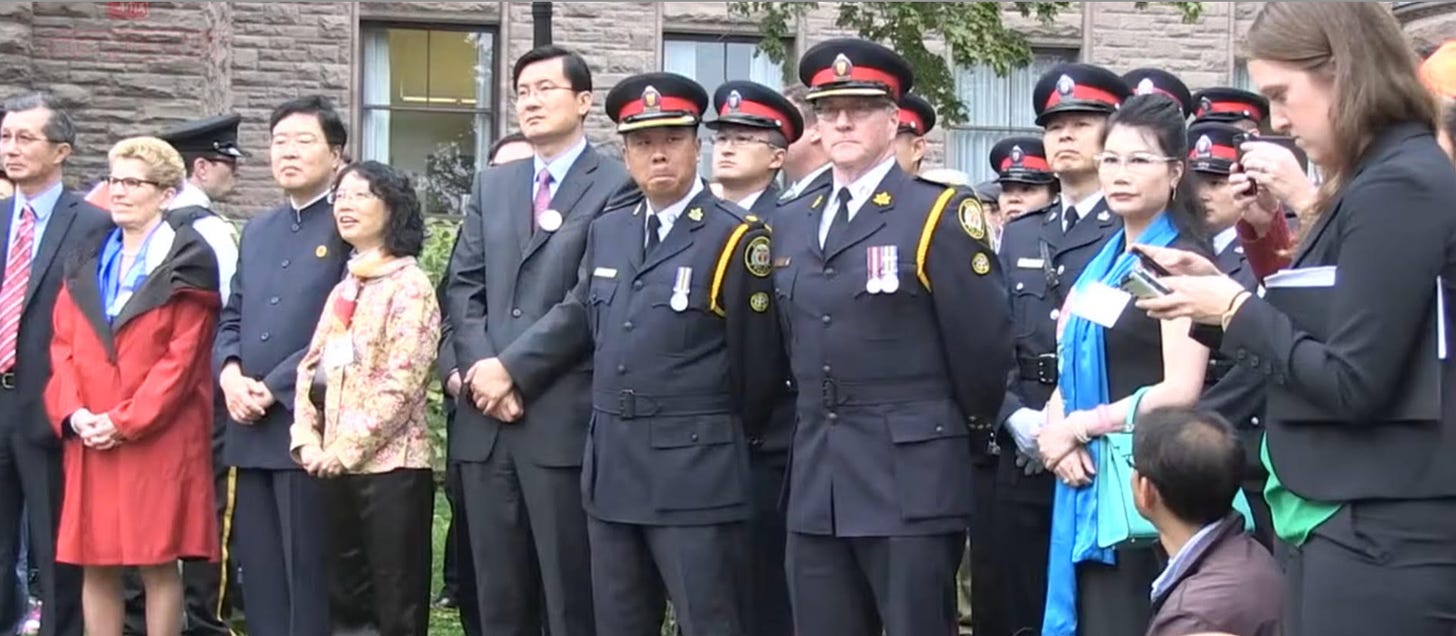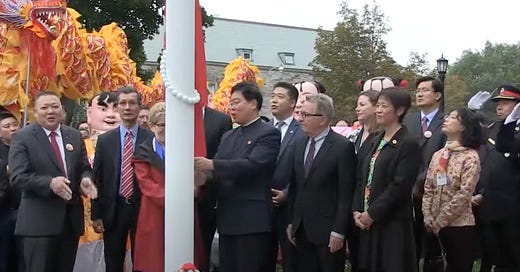How I Developed Sources For The PRC Election Interference Story: Wilful Blindness 3rd Edition Excerpt
Confidential Source 2 informed me of the Michael Chan “Section 21” warrant and frustration surrounding CSIS investigations that went all the way to Prime Minister Justin Trudeau’s office

Founder’s Note: This excerpt from the Third Edition of Wilful Blindness—containing information relevant to upcoming testimony in the Hogue Commission—is being released in advance of the book’s relaunch on October 22nd.
OTTAWA, Canada — On June 3, 2022, I sent the following message to a Canadian government expert who had contacted me regarding my research into Chinese whale gamblers, such as Markham casino kingpin Wei Wei, and Liberal Party officials, including a confidante of Justin Trudeau that I will call X, who was the subject of Fintrac suspicious transaction documents that I reported on.
“I’m learning the US government is apparently taking a lot of interest in my work. I’m also seeing tremendous UF [United Front] influence efforts in our elections and candidate campaigns.”
My reports on the Fintrac transaction suspect X in November 2021 had drawn this expert’s attention, I supposed, because X had been on the payroll at Queen’s Park, Ontario’s legislature, as a community outreach official from 2007 to 2014, under the governments of Liberal premiers Dalton McGuinty and Kathleen Wynne. This was recorded in a Fintrac document—an official Canadian government record. The document noted that X’s reported annual salary in Canada was just $26,000.
I also knew that X was seen as a VIP in McGuinty’s circle—he was seated next to McGuinty’s table at the premier’s Chinese New Year celebration in 2009, along with numerous “community leaders” known to CSIS investigators in Toronto. So why was he receiving millions in suspicious wire transfers from Hong Kong?
By June 3, 2022, I had also learned from public records that X was not only a VIP in the governments of Wynne and McGuinty, but also, according to his LinkedIn profile, the fundraising co-chair for the federal Liberal Party in 2014. He was often pictured with Liberal Party heavyweights in Markham, including Mary Ng, the MP who replaced former defence minister John McCallum in a 2017 by-election coveted by many Liberal hopefuls. Ng won the prized nomination, vaulting from Justin Trudeau’s office and inner power circle into Parliament, and was soon promoted to minister of trade. Before securing her party’s nomination, she, like many of Trudeau’s senior aides, had moved with her friend Katie Telford from Queen’s Park to the Prime Minister’s Office.
And when Justin Trudeau ran his first federal election campaign as Liberal leader in 2015, many of Kathleen Wynne’s senior political staffers—including Gerald Butts, Katie Telford, and Brian Clow—headed to Ottawa to mastermind it. They ultimately became Trudeau’s kitchen cabinet.
“Kathleen Wynne’s brain drain is Justin Trudeau’s gain,” said the National Post in November 2015. “The new prime minister received more than the Ontario premier’s vocal support on the campaign trail: he also borrowed a number of her top staff. Queen’s Park veterans Katie Telford and Gerald Butts ran his election campaign and serve as top advisors—she’s Trudeau’s chief of staff, he’s his principal secretary. Now, a growing number of Ontario government staff are packing their bags for the drive down the 401 to take up permanent positions in the Prime Minister’s Office and as staff to his cabinet ministers.”
Soon to join the pro-Beijing spinmeisters in Trudeau’s inner circle was BC premier Christy Clark’s former senior aide Ben Chin, who was there when Premier Clark dove headfirst into deals with Poly Culture, a People’s Liberation Army front welcomed to Vancouver by her and luminaries like future senator Yuen Pau Woo.
To recap what I knew by early 2022: the campaign brainiacs who had relied on X to raise funds from the Chinese community for Kathleen Wynne’s Ontario Liberal government also relied on him to raise funds for Justin Trudeau’s election win in 2015. While I didn’t have hard proof, I was well aware that fundraising, when driven by operatives like X, could foster bonds of obligation that might influence a politician’s office in subtle ways. Perhaps key staff positions, and even plum ridings for favored candidates, would follow? Do the Chinese Communist Party’s donors become so integral to the finances of some democratic political parties, I wondered, that they can move Beijing’s pawns into kinglike positions in foreign governments?
That’s exactly how it works, according to former New Zealand National Party MP Jami-Lee Ross, who in 2018 blew the whistle on his party’s leaders and implicated himself in a Chinese cash-for-influence scandal. Ross claimed he rose in his government as a candidate “groomed” by United Front community leaders. “They start to groom you almost from the beginning of your political career. They pick someone who’s young, in a safe seat that may be seen as having a trajectory upwards, and they gain closeness,” Ross told New Zealand’s Stuff Circuit in 2024. “So I started to go to the fundraising events. I started to organize fundraising events... If you’re the leader of the National Party, you’re not going to go out and kick around the Chinese government because you know you’re going to have to front up at the Chinese fundraising event that your Chinese MPs organize for you the next week.”
Tellingly, Ross added: “What average New Zealander out there can get the leadership of a political party to go to their home for dinner? What average person out there could just click their fingers and command 10 MPs to come to their event? Most people can’t. Money buys their influence.”
Back to X.
I also knew, from Canadian media cash-for-access stories, that he had arranged an infamous May 2016 fundraising dinner at the home of a pro-Beijing Toronto businessman, where Trudeau met with United Front tycoon Bin Zhang, 5 DeCourcy boss Wei Wei, and a couple of dozen Toronto-based United Front businessmen. In fact, X was “the chief Liberal ambassador to deep-pocketed Chinese-Canadian business executives,” according to The Globe and Mail. I assessed that my new government source knew the same things Globe reporters did—and much more.
By early June 2022, the government expert, who I hadn’t met in person, suggested I look into what public appearances X was making, what types of investment deals he was doing, who he hung around with, and what companies popped up on his social media feeds. They hinted I should be looking more closely at those “deep-pocketed Chinese-Canadian business executives” surrounding Justin Trudeau at the May 2016 cash-for-access fundraiser. It seemed my instincts about X’s financial activities and political connections were on the right track.
This new government source was also interested in my journalistic insights into people who came to Canada as immigrant investors with ties to illegal casinos and Chinese officials—people like Wei Wei. They seemed curious about my understanding of Chinese organized crime’s incestuous ties to politics and business. This knowledge didn’t come from classified leaks, but from leveraging my diaspora intelligence, political source networks, and my own pattern-recognition abilities. This allowed me to identify the United Front’s psychological operations against Conservative MP Kenny Chiu and party leader Erin O’Toole in 2021—long before the Hogue Commission began looking into foreign election interference.
Once I had pieced this together, I had the confidence to tell this government source—whom I now refer to as “Confidential Source 2”—that I was seeing “tremendous UF influence efforts in our elections and candidate campaigns.” In hindsight, those words likely motivated Confidential Source 2 to meet me in person.
The meetings that followed ultimately led to the formation of the Hogue Commission and the bombshell 2024 review by the National Security and Intelligence Committee of Parliamentarians (NSICOP). These bodies informed Canadians that a number of MPs and senators were colluding with Beijing.
To be more precise, my clandestine meetings with high-placed Canadian intelligence sources corroborated what I had discovered in May 2020: a direct line from Vancouver-based United Front media outlets and Beijing proxies attacking my reporting to the Chinese intelligence operatives supporting some federal election candidates in 2019 and attacking others, including Kenny Chiu, in 2021. It was the same networks pursuing the same goals.
Tradecraft
I first met Confidential Source 2 at a restaurant in Ontario, one of those dimly lit drink-and-dine franchises you can find at malls across North America. The person was careful to the point of nervousness, I thought. I sipped a coffee and tucked my notebook under the saucer, basically trying to look interested without conveying the intensity I was feeling. I didn’t want to spook the person across the table because I knew they were edging out on a very dangerous limb, as well as carefully judging my trustworthiness. The person grimaced when I mentioned the name of a Canadian government agency. I said sorry and got the message: No acronyms. Don’t say CSIS or CSE. The person was worried someone in the restaurant would overhear. In the careful conversation that followed, I got my first stunning download of information relative to ongoing CSIS investigations that went all the way to Prime Minister Justin Trudeau’s office. This first meeting provided the general backdrop to my reporting at Global News, which started six months later, in November 2022.




